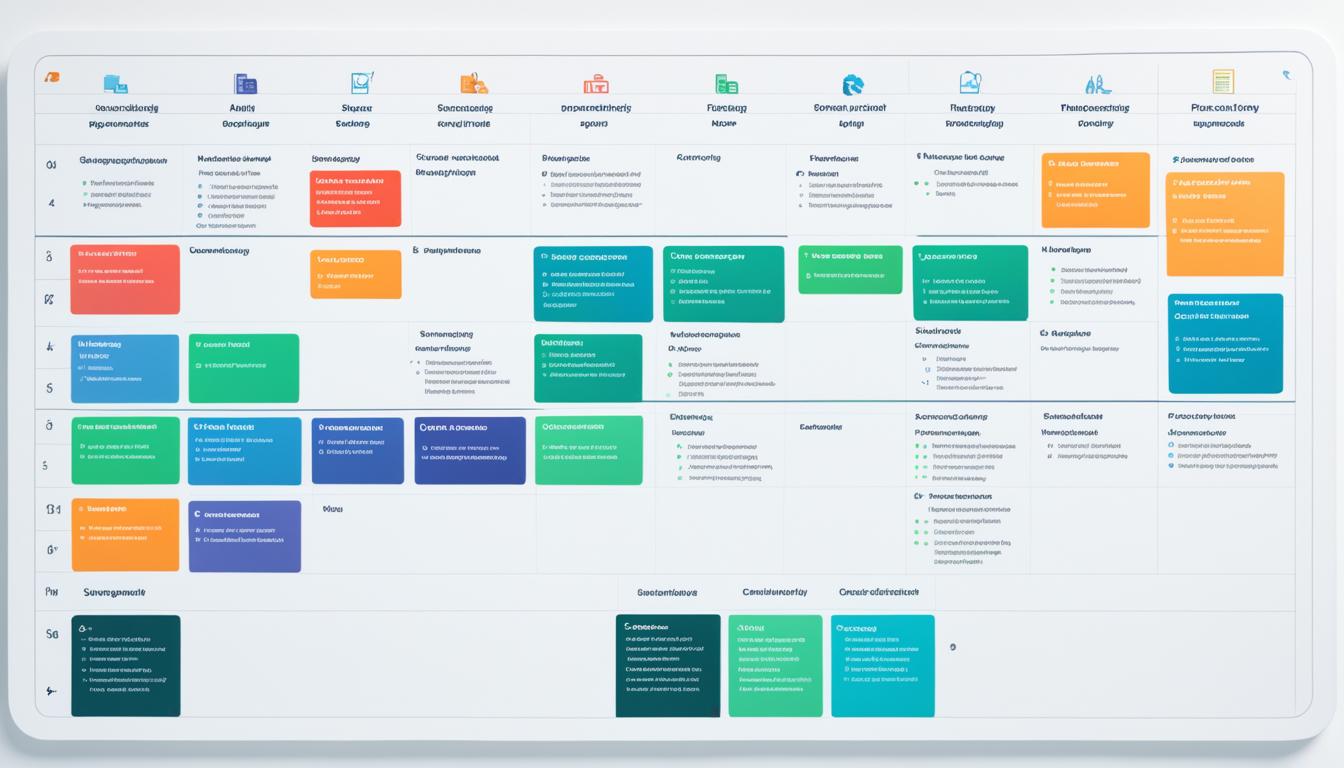
Startup Branding: How to Stand Out in a Crowded Market

In the words of legendary entrepreneur Steve Jobs, “Your brand is what other people say about you when you’re not in the room.” In today’s highly competitive business landscape, building a strong brand and standing out in a crowded market is essential for startups to thrive. It’s no longer enough to have a great product or service – you need a strategic approach to brand positioning and differentiation.
To successfully navigate this challenge, startups must focus on defining their niche, creating a strong brand identity, and continuously innovating to deliver excellence. In this article, we will explore the key strategies and tactics that can help startups stand out in a crowded market and gain a competitive advantage.
Key Takeaways:
- Defining a specific niche and targeting a specialized market segment can differentiate your startup from the competition.
- Building a strong brand goes beyond a logo – it involves defining your values, developing a visual identity, and communicating your brand story.
- Continuous innovation and delivering excellence are key to staying ahead in a crowded market and attracting customers.
- Strategic branding and a well-executed marketing strategy are crucial for gaining a competitive advantage.
- By differentiating yourself and standing out, you can position your startup as a leader in your industry and attract loyal customers.
Focusing on Your Niche
To make your startup stand out, you need to focus on targeting a specific niche. By narrowing down your market segment, you can tailor your product or service to meet the unique needs of that particular niche. This targeted approach allows you to differentiate yourself from the competition and position your startup as the go-to solution for customers within your chosen niche.
Specializing in a niche gives you the opportunity to highlight your unique selling point. This is what sets you apart from others and gives customers a reason to choose your startup over your competitors. By emphasizing your specialized offering, you can establish yourself as an expert in your industry and attract customers who value the expertise and value you bring to the table.
Targeting a niche also allows you to build strong relationships with your customers. Since you’re focusing on a specific audience, you can better understand their pain points, preferences, and desires. This deeper understanding enables you to provide a more tailored and personalized experience for your customers, ultimately leading to greater customer satisfaction and loyalty.
In order to effectively target your niche and highlight your unique selling point, it’s important to conduct thorough market research. This will help you identify gaps in the market, understand your target audience, and tailor your marketing strategies to reach them effectively.
The Benefits of Focusing on Your Niche
A targeted approach has several benefits for your startup:
- Increased customer loyalty: By catering to a specific niche, you can build a dedicated customer base that values your specialized offerings.
- Reduced competition: Focusing on a niche allows you to differentiate yourself from broader competitors and position yourself as an expert within your field.
- Higher conversion rates: When you tailor your product or service to the needs of a specific niche, you can better address their pain points and deliver a solution that resonates with them, resulting in higher conversion rates.
- Greater brand recognition: By positioning yourself as an expert within your niche, you can build a strong brand identity and establish a reputation that resonates with your target audience.
By focusing on your niche, highlighting your unique selling point, and delivering a specialized offering, you can position your startup for success in a crowded market. Targeting a specific audience and catering to their specific needs allows you to stand out and build a strong brand that resonates with your target market.
Building a Strong Brand
Building a strong brand is essential for startups looking to stand out in a crowded market. A strong brand goes beyond a logo or tagline and encompasses the values, mission, and story of the company. Startups should define their core values and develop a brand identity that reflects those values. This includes creating a visual identity with a logo, color palette, and typography that is consistent across all marketing materials. By establishing a strong brand image and communicating it effectively, startups can differentiate themselves from the competition and build customer loyalty.

Visual identity plays a crucial role in creating a strong brand. When customers see consistent visual elements associated with a brand, it helps create familiarity and trust. Consistency in design elements such as colors, fonts, and logo placement helps reinforce brand recognition and recall. It’s important to ensure that the visual identity reflects the personality and values of the brand.
One way to build a strong brand is by developing a cohesive branding strategy. This involves defining the target audience, understanding their needs and preferences, and crafting brand messages that resonate with them. By consistently delivering these messages through various marketing channels, startups can create a strong brand presence in the market.
| Components of a Strong Brand | Importance |
|---|---|
| Brand Identity | Defines the essence of the brand and how it is perceived by customers. |
| Branding Strategy | Guides the overall direction and communication of the brand. |
| Visual Identity | Creates recognition and consistency across marketing materials. |
| Consistency | Builds trust and reinforces brand recognition. |
| Brand Image | Represents the perception and reputation of the brand. |
By focusing on building a strong brand with a well-defined brand identity, startups can establish a unique position in the market and create a strong connection with their target audience. A strong brand helps create trust, loyalty, and a competitive edge for startups in a crowded market.
Innovating and Delivering Excellence
In a crowded market, startups face fierce competition and the pressure to stand out. To overcome these challenges, it’s crucial for startups to focus on continuous innovation and delivering excellence. By staying ahead of the curve and continuously improving their products or services, startups can gain a competitive advantage and differentiate themselves from others in the market.
One way startups can drive innovation is by actively seeking feedback from their customers and users. By understanding their needs and pain points, startups can identify areas for improvement and make meaningful updates to their offerings. This process of continuous improvement ensures that startups are delivering value that aligns with customer expectations, setting them apart from competitors.
Moreover, startups can gain insights from industry trends and use them as inspiration for innovation. By monitoring emerging technologies, market shifts, and customer behaviors, startups can identify new opportunities to solve adjacent problems and create unique value propositions. By staying attuned to the evolving landscape, startups can avoid becoming stagnant and continue to innovate, keeping their offerings relevant and competitive.
When it comes to delivering excellence, startups should prioritize providing consistent high-quality products or services. By maintaining strict quality standards and meeting customer expectations time and time again, startups can build a reputation for reliability and excellence. This not only helps them retain existing customers but also attracts new ones, providing a significant competitive advantage.
Exceptional customer service is another crucial aspect of delivering excellence. By prioritizing prompt and helpful support, startups can forge strong relationships with their customers. This not only leads to customer loyalty but also generates positive word-of-mouth, further enhancing their competitive advantage. Customer feedback should be seen as a valuable resource for startups, enabling them to identify areas for improvement and take proactive measures to address customer needs.
Key Takeaways
- Continuous innovation and improvement are essential for startups to differentiate themselves in a crowded market.
- Seeking feedback from customers and users helps startups identify areas for improvement and deliver value that aligns with customer expectations.
- Monitoring industry trends enables startups to identify new opportunities for innovation and stay ahead of the competition.
- Consistently delivering high-quality products or services builds customer trust and loyalty, giving startups a competitive advantage.
- Exceptional customer service strengthens relationships with customers and generates positive word-of-mouth, further enhancing a startup’s competitive advantage.
How Startups Can Innovate and Deliver Excellence
| Strategies | Benefits |
|---|---|
| Actively seeking customer feedback | – Identifying areas for improvement – Enhancing customer satisfaction – Delivering value that aligns with customer expectations |
| Monitoring industry trends | – Identifying new opportunities for innovation – Staying ahead of the competition – Solving adjacent problems |
| Maintaining high-quality standards | – Building customer trust and loyalty – Retaining existing customers – Attracting new customers |
| Providing exceptional customer service | – Strengthening customer relationships – Generating positive word-of-mouth – Differentiating from competitors |
Conclusion
Standing out in a crowded market is no easy task for startups. However, by implementing strategic branding, focusing on brand differentiation, and continuously innovating, you can gain a competitive advantage and make your mark in the industry.
To start, it’s important to define your niche and develop a unique selling point that sets you apart from your competitors. By honing in on a specific market segment and catering to their specific needs, you can position yourself as the go-to solution for that audience.
Building a strong brand identity is also key to standing out. Establishing your core values, creating a consistent visual identity, and effectively communicating your brand story will help you differentiate yourself and build customer loyalty.
Continuously innovating and delivering excellence will further set you apart from the competition. By seeking feedback from your customers, iterating on your products and services, and staying ahead of industry trends, you can ensure that you always offer a unique and valuable proposition to your target market.
In conclusion, mastering brand differentiation, gaining a competitive advantage, and standing out in a crowded market requires strategic branding, a commitment to innovation, and a focus on delivering exceptional customer experiences. By focusing on these key aspects, you can position your startup as a leader in the industry and attract a loyal customer base. In today’s competitive business landscape, strategic branding is crucial for success.





























